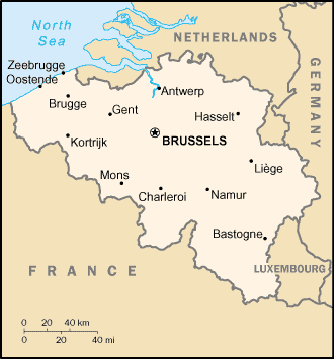
Belgium: Education, Taxation And Living Standard
Published 20th July 2014
Belgium officially the Kingdom of Belgium, is a federal monarchy in Western Europe. It is a founding member of the European Union and hosts the EU's headquarters as well as those of several other major international organisations such as NATO. Belgium covers an area of 30,528 square kilometres (11,787 sq mi), and it has a population of about 11 million people. One of the world's highest tax rates, and the highest of Western European countries, has been imposed on the citizens of Belgium. On average, Belgium taxpayers are taxed a marginal rate of 54.9%. The country's growing unemployment and a lackluster economy have attributed to its high taxes, according to economists.
Straddling the cultural boundary between Germanic and Latin Europe, Belgium is home to two main linguistic groups: the Dutch-speaking, mostly Flemish community (which constitutes about 59% of the population), and the French-speaking, mostly Walloon population (which comprises 41% of all Belgians) Education is compulsory from 6 to 18 years of age for Belgians. Among OECD countries in 2002, Belgium had the third highest proportion of 18- to 21-year-olds enrolled in postsecondary education, at 42%. Though an estimated 99% of the adult population is literate, concern is rising over functional illiteracy. The Programme for International Student Assessment (PISA), coordinated by the OECD, currently ranks Belgium's education as the 19th best in the world, being significantly higher than the OECD average. Education being organised separately by each, the Flemish Community scores noticeably above the French and German-speaking Communities.
Belgium is a constitutional, popular monarchy and a federal parliamentary democracy. The bicameral federal parliament is composed of a Senate and a Chamber of Representatives. The former is made up of 40 directly elected politicians and 21 representatives appointed by the 3 Community parliaments, 10 co-opted senators and the children of the king, as Senators by Right who in practice do not cast their vote. The Chamber's 150 representatives are elected under a proportional voting system from 11 electoral districts. Belgium has compulsory voting and thus holds one of the highest rates of voter turnout in the world.
Belgium is one of the 20 wealthiest countries in the world. The living standard in Belgium is very high. However, this does not apply to all of Belgium’s inhabitants: a significant number of Belgians live on the margin of society and they cannot manage because of a lack of financial means. 7.7% of the Belgian and 6.9% of the Flemish population live below the poverty line: they do not have sufficient means to live properly in Belgium – meaning according to Belgian standards. Some 420,000 children in Belgium are growing up in a poor family, with most of them living in Wallonia and Brussels. Brussels scored the worst, faring worse than trailing countries Bulgaria and Romania: 4 in 10 children grow up in a poor family in the capital.
This poverty is not only caused by a shortage of money; economic poverty often goes hand in hand with social exclusion. They are denied several basic human rights, such as an income, housing, health care, education, a job, social and political participation. Through this isolated position on the edge of society, many of them fall into a vicious circle which continues to exist from generation to generation. This dead-end situation often gets worse when they face other hardships such as divorce, bankruptcy and illness.